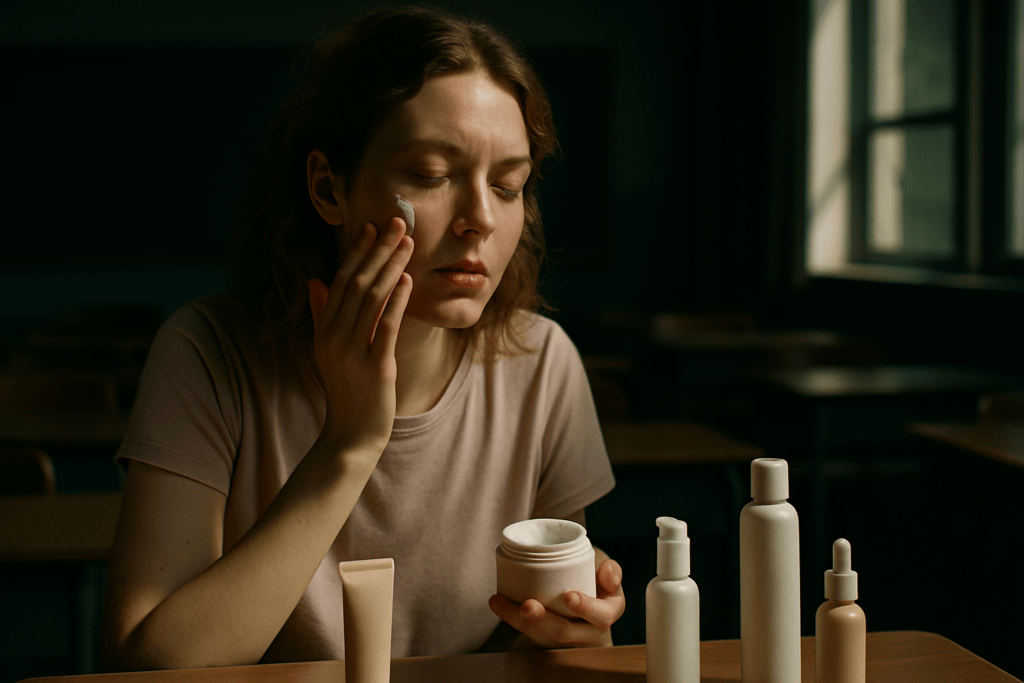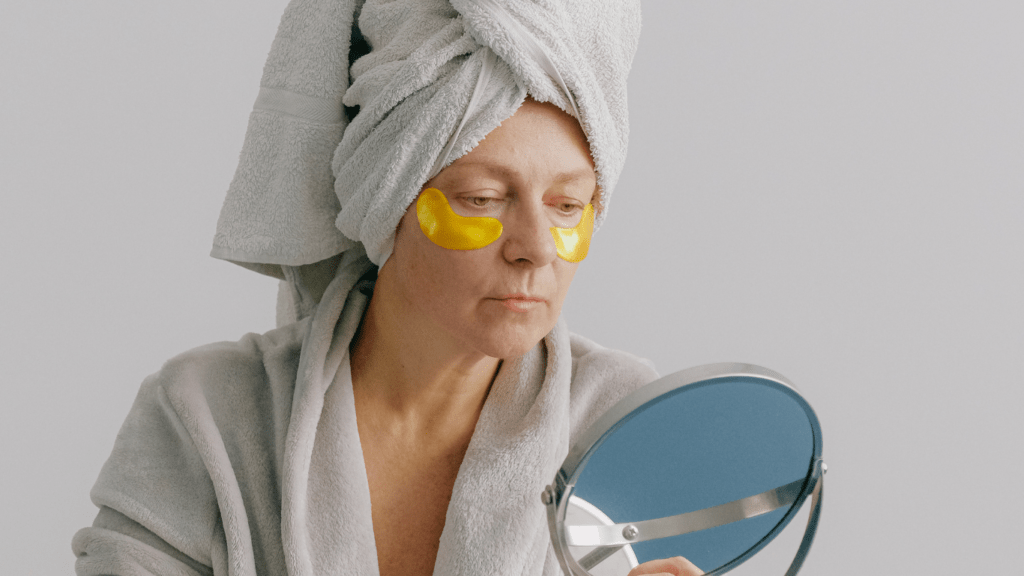Understanding Your Skin’s Nighttime Needs
Your skin naturally undergoes repair and regeneration at night. These processes intensify around 10 PM, peaking between 11 PM and 2 AM, when your body is in deep sleep. It’s essential to support these processes by understanding your skin’s unique nighttime needs.
Increased Blood Flow
Blood flow to the skin increases at night, allowing your skin to absorb active ingredients more effectively. This heightened absorption makes applying targeted treatments like retinoids, peptides, and hydrating serums more beneficial.
Reduced Environmental Stressors
At night, your skin doesn’t face environmental stressors like UV rays and pollution. This reduction gives your skincare products a chance to work unimpeded. Using products with antioxidants can provide an extra boost during this time.
Higher Cell Turnover
Cell turnover rates are higher during the night. Using exfoliants like AHAs (alpha hydroxy acids) helps in removing dead skin cells, making way for newer, healthier cells to surface faster. This contributes to improved skin texture and radiance.
Increased Dehydration
Skin loses more moisture at night. To combat this, use a heavier moisturizer or an overnight hydrating mask. Ingredients like hyaluronic acid and ceramides can lock in moisture, preventing morning dryness.
Collagen Production
Collagen production peaks during sleep, aiding in skin firmness and elasticity. Incorporating products with collagen-boosting ingredients like vitamin C can amplify this natural process, minimizing the appearance of fine lines and wrinkles.
Personalized Skincare
Identifying and addressing your skin type’s specific needs is crucial. For oily skin, opting for non-comedogenic products helps prevent clogged pores. Dry skin benefits from rich, emollient formulas. Tailoring your routine ensures you’re meeting your skin’s particular requirements.
These key aspects highlight your skin’s unique nighttime needs and how to address them effectively for the best overnight results.
Key Ingredients for Effective Nighttime Skincare

Effective nighttime skincare hinges on key ingredients that enhance skin repair and regeneration. Here are the essential components to include:
Retinol
Retinol, a derivative of vitamin A, accelerates cell turnover. It smooths fine lines and evens out skin tone. Most dermatologists recommend starting with a lower concentration to minimize irritation. An example includes using 0.25% retinol serums to let your skin adjust before progressing to higher concentrations.
Hyaluronic Acid
Hyaluronic acid (HA) excels at hydration. It holds up to 1,000 times its weight in water, making it essential for keeping skin plump and moisturized. Apply HA before heavier creams to lock in moisture. Products like 2% HA serums boost hydration better than lower percentages.
Peptides
Peptides serve as building blocks for collagen and elastin. They signal the skin to produce more collagen, reducing the appearance of fine lines. Common peptide-infused products include serums and moisturizers. Peptide combinations like Matrixyl 3000 and copper peptides deliver optimal results by synergizing their effects.
These ingredients, when integrated into your nighttime routine, significantly elevate the skin’s repair processes and ensure glowing skin by morning.
Step-by-Step Nighttime Skincare Routine
Follow a nighttime skincare routine to amplify skin’s natural repair processes and wake up to refreshed and rejuvenated skin.
Cleanse Thoroughly
Remove makeup and impurities with a gentle cleanser. Ensure the cleanser suits your skin type, whether:
- normal
- oily
- dry
- sensitive
This step prevents clogged pores and prepares the skin for subsequent products.
Apply Toner
Balance skin’s pH with an alcohol-free toner. Dab a small amount onto a cotton pad and gently swipe across clean skin. This step also removes any remaining cleanser residue and preps the skin for better absorption of other products.
Use a Serum
Target specific skin concerns with a concentrated serum. Opt for ingredients like hyaluronic acid for hydration or retinol for anti-aging. Apply a few drops and gently press into the skin to enhance absorption.
Moisturize
Lock in moisture with a suitable nighttime moisturizer. Choose a rich, emollient formula for dry skin or a lightweight gel for oily skin. This step ensures hydration and support for the skin’s repair processes.
Don’t Forget Eye Cream
Care for the delicate eye area with a specialized eye cream. Apply a pea-sized amount using your ring finger to minimize pressure. This step reduces puffiness and diminishes fine lines and dark circles.
Extra Tips for Maximizing Results
Maximize the benefits of your nighttime skincare routine with a few additional tips. These insights ensure you wake up with radiant skin.
Consistency is Key
Sticking to a routine provides noticeable results.
- Consistent use of the same high-quality products helps the skin adapt and respond better over time.
- Avoid frequently switching products, as this can disrupt your skin’s balance and delay improvements.
- Document any changes in your skin’s condition and adjust the routine only when necessary.
Stay Hydrated
Hydrated skin is more resilient and absorbs products better. Drink at least eight glasses of water daily to maintain skin hydration. Incorporate hydrating products, like a night cream rich in hyaluronic acid or glycerin, to lock in moisture overnight. Dehydration can make skin look dull and accentuate fine lines, so focus on internal and external hydration.
Get Adequate Sleep
Quality sleep directly impacts skin health. Aim for 7-9 hours of sleep per night to give your skin ample time to repair and regenerate. Sleep in a clean, comfortable environment to minimize stress on your skin. Elevate your head slightly to prevent fluid retention around your eyes and reduce puffiness. Use a silk or satin pillowcase to reduce friction and avoid potential irritation.


 Fashion and Beauty Editor-in-Chief at Divine Glamour Trail, is the creator of the platform, which is dedicated to sharing the latest trends in hairstyles, beauty, and skincare. With a passion for timeless fashion and practical style advice, Virginiana provides updates, tips, and insights that inspire readers to elevate their personal style. Her platform blends modern trends with enduring elegance, helping individuals feel confident and look their best.
Fashion and Beauty Editor-in-Chief at Divine Glamour Trail, is the creator of the platform, which is dedicated to sharing the latest trends in hairstyles, beauty, and skincare. With a passion for timeless fashion and practical style advice, Virginiana provides updates, tips, and insights that inspire readers to elevate their personal style. Her platform blends modern trends with enduring elegance, helping individuals feel confident and look their best.
